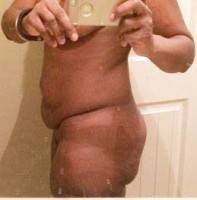Tummy tuck overweight
Tummy tuck in overweight people
Depends what is your end goal. To be the best you can be or get less than ideal but acceptable outcome. If you want the best results, you need to be at your ideal weight 140-150 lbs.
The key is to keep the weight down, not just get thewre. you are doing enough exercise and now you need to address your nutrtional status. If you can’t wait and consider surgery, you will need a lot of liposuction of the back, hips and thighs in conjunction with the abdominoplasty.
I often incorporate a breast lift at the same time. You also need to know, that if you loose weight after the abdominoplasty, you might need further skin excision and liposuction.
You need to consult with a board certified plastic surgeon with extensive experience in these combined procedures. (George Marosan, MD, Bellevue Plastic Surgeon)
Consider BMI to determine if weight loss is needed before a tummy tuck
Without examining you, it’s tough to figure out if you “need” to lose weight before a tummy tuck. A good general indicator for weight and height is BMI- body mass index. There are several websites on the internet that calculate your height to weight ratio to generate a number, which is your BMI. In general, to be a good candidate for a tummy tuck, your BMI should be overweight but not obese. BMI is not perfect. If you have alot of muscle, that can throw the results off, because muscle weighs more than fat. If you’re very muscular, your BMI will skew a little higher. Another consider is visceral fat versus external fat. If you have alot of visceral, or internal fat, then a tummy tuck can’t address or remove the fat around your abdominal organs, such as your liver, intesttines, spleen, etc.
You need to have overall weight loss to remove internal fat. Given your numbers, I’ve calculated your BMI to be 31.9, which is above 30 and thus considered more than overweight.
Get examined by a plastic surgeon, but assuming your numbers are accurate and you’re not extremely muscular, you may want to consider losing 10-20 pounds before any tummy tuck procedure. (Roy Kim, MD, San Francisco Plastic Surgeon)
Should I Get a Tummy Tuck While Still Overweight?
You can obtain better results if you lost more weight (like 20 pounds more) But if you can not than find a boarded PS to advise and operate on you. (Darryl J. Blinski, MD, Miami Plastic Surgeon)
Overweight, wanting Tummy Tuck
You should lose the extra weight before an abdominoplasty. Your BMI is 31.1. Your weight needs to be no more than 141 lb. Your problem is not the exercise, for which you should be commended. It is your diet. People on the wrong diet can exercise as much as they can, and never lose weight until they get on a proper diet. Think about it. If you are 20 lb. overweight (and you are about double that), it is like carrying a 20 lb. Bar-B-Q grill tank around all the time. That is a lot of exercise.
You are exercising more than thinner people, JUST by carrying the extra weight around everywhere, yet, you are not losing the weight. Before spending money on the Tummy Tuck, invest in someone to help you with your diet so you can lose the remaining weight. Once on the proper diet, the exercise will help you lose faster and become much healthier. Then do the abdominoplasty. (Robert T. Buchanan, MD, Highlands Plastic Surgeon)
Weight loss and tummy tuck
If you are actively loosing weight, then I suggest that you continue to do so before you get a tummy tuck. (Steven Wallach, MD, Manhattan Plastic Surgeon)
Timing of Tummy Tuck with Weight Loss
Congratulations on your weight loss. You almost certainly would be a candidate for a tummy-tuck combined with liposuction. If you have a great deal of loose skin, you may require an extended tummy-tuck. For optimal results you should be within 10 to 15 pounds of your final weight. This approach would minimize the possibility of recurrent skin laxity with further weight loss after your procedure. I would recommend consulting with a board-certified plastic surgeon. Based on your BMI and a realistic goal weight he/she can advise you on the timing of the procedure. (Andrew T. Lyos, MD, FACS, Houston Plastic Surgeon)








